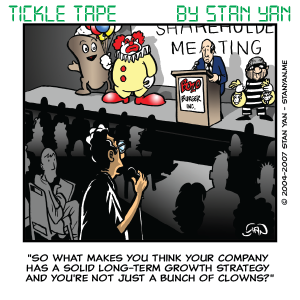Have you ever put your time and money into a project and received nothing for it. Perhaps it’s a classic car you’ve been meaning to restore that’s been sitting in the garage for 10 years or your grandparents’ antique sofa that you put in a storage unit until you can find a way to fit it into the décor of your living room. It has sentimental value and you just don’t want to part with it. It’s worth the $80 a month to keep it in storage, right? Maybe you can give it to your children, but at $80 a month for 10 years? That’s $9,600! Is the sentimental value worth it?
That’s up to you, but for some people, $9,600 is a lot to pay for sentimental value. We can get overly attached to our possessions to the point that we do whatever we can to keep them, rather than just let go of them. This attitude can transfer to the trading realm as well. People can become so overly attached to a stock that they act emotionally as if the stock has sentimental value. But stocks aren’t for owning and keeping. Stocks are for trading and making money.
Sunk cost effects are powerful. Our time and energy are precious, and when we devote valuable resources to an activity, in everyday life or trade, we want to believe we didn’t squander the few assets we have available. When we make a trade, we want to believe that we made a good decision. A nagging voice in the back of our minds whispers, “Why did you risk resources if you did not think that you could make a decent profit?” Your first inclination is to shout, “I didn’t.” But you may have, and it’s all right if you did. When you make a trade that isn’t working out, don’t be afraid to admit it. Don’t try to justify your decision.
Everyone makes mistakes, and winning traders make a lot of them on their way to enduring profitability. Don’t place more meaning on a trade than necessary. It’s just a business deal, and when you do make a poor trading decision, don’t be afraid to admit it. Don’t be riddled with guilt or regret. Many times, we avoid admitting that we made a poor decision because we are afraid of the emotional consequences.
We see ourselves as competent and astute, and when we make a mistake, it can make us feel inept and obtuse. It’s easier to try and ignore it, and save face. For example, you can leave a losing trade on paper and hope that market conditions will improve and you’ll recoup your losses. It’s usually better to just face the loss, though. Just accept your limitations, and move on. It can be difficult, but you can make it easier by remembering the motto, “Don’t feel bad about feeling bad.” So you made a mistake. Make light of it and move on.
Rather than react emotionally with guilt or anxiety, it’s better to stay objective. When you objectively look at a trade, you’ll be less afraid to study the consequences in meticulous detail. You’ll monitor your trades, look honestly at how well you’re doing and neutralize the sunk cost effect. The sunk cost effect is powerful. It’s the demise of many traders who fruitlessly try to ignore what they did wrong, and in doing so remain stuck and uneasy. But if you find the courage to objectively acknowledge when you were wrong, you can take setbacks in stride, and move on to the trades that make you a winning trader.


